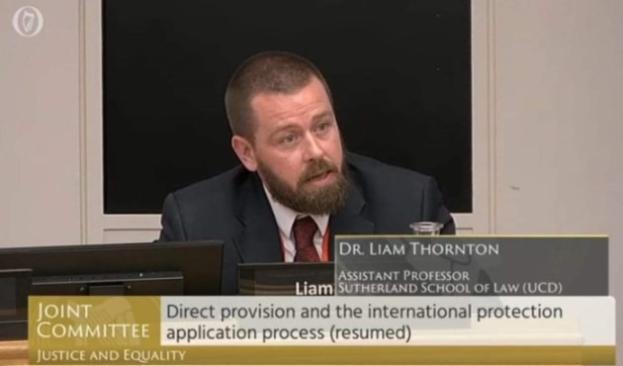Summary
‘Direct provision’ is the system that Ireland uses to accommodate and provide limited social and economic rights for people seeking asylum. When introduced in April 2000, the government stated that people would be in the system for a maximum of six months. Some 22 years later, over 7,000 people are in direct provision, often spending years waiting for their asylum claim to be processed. The Irish Government has finally committed to ending direct provision by 2024.
Dr Thornton’s research has enhanced legal and policy analysis of the system, assisting protection seekers, activists, civil society and politicians in advocating for the end to direct provision. His research informed public discourse on the human rights violations caused by direct provision, and contributed to enabling legal change to end it.
Research description
Dr Thornton’s academic research on direct provision shows that this system significantly and unjustifiably limits the human rights of persons seeking international protection in Ireland. His research has identified several core features of direct provision:
 Limited access to social welfare rights.
Limited access to social welfare rights.- Limited access to the labour market.
- Limited protection of rights to family and home life, the rights of the child, and the rights of those who arrive in Ireland as unaccompanied children and after turning 18 are placed in the direct provision system.
While reforms have helped lessen some of these rights violations, the wholescale institutionalisation of asylum seekers in the direct provision system violates human rights. Until 2018, the system of direct provision was not set out in legislation. Because of this, Dr Thornton resorted to innovative use of the Freedom of Information Act to analyse how high-level policymakers in the Government and civil service engaged with questions of law and human rights of people in the direct provision system. After 2018, Dr Thornton’s research focus shifted to analysing asylum seekers’ rights under proposed and implemented reforms to direct provision.
Together, these activities led to the UCD-funded project Exploring Direct Provision, which provides wider access to otherwise unavailable government decisions and policy discussions on the system of direct provision. Through his research, Dr Thornton has engaged with legal and political systems in search of a desirable outcome: core protection of human rights for people seeking international protection and an end to direct provision.
What is clear from Thornton’s research is that over the past 20 years, the purpose of direct provision has been to deter people from coming to Ireland to claim asylum.
—Bulelani Mfaco, Movement of Asylum Seekers in Ireland
 Dr Thornton’s research contributed to policy analysis and legal understanding of the system of direct provision. He has helped shape public discourse on the issue, and has provided expert analysis to enable legal change, which ultimately seeks to protect the human rights of people currently in direct provision.
Dr Thornton’s research contributed to policy analysis and legal understanding of the system of direct provision. He has helped shape public discourse on the issue, and has provided expert analysis to enable legal change, which ultimately seeks to protect the human rights of people currently in direct provision.